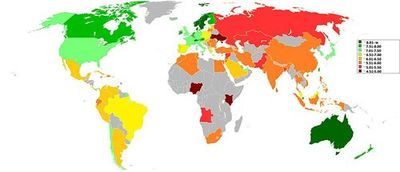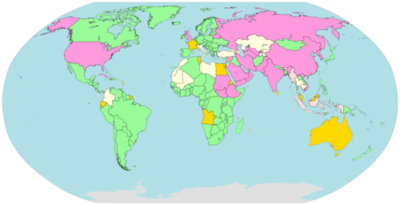Both surveillance and censorship seem to grow around the world in the past few years, in a somewhat unexpected way. Pretty much any map from Wikipedia, which shows where bad things happen, looks like this one:

A regular map
That is, there is BRICS (“Brazil, Russia, India, and China Suffer together”), it is fine in Europe, US, Canada and Australia, and there is not much of civilization in Africa. But when it comes to internet censorship and surveillance, US and UK join the unfortunate countries (apparently it is mostly because of surveillance, not censorship), while Africa and Brazil are mostly doing well, and Australia hangs in the middle:

An internet censorship and surveillance map
There also is another map, focused on censorship, which is more like a regular one, and one more, focused on freedom of press. Also the Enemies of Internet are not quite equal: common knowledge suggests that it is particularly bad in China and in North Korea. We decided to find out how do people obtain information in North Korea, in order to be prepared to the worst-case scenario – if the rest of the world will get to its levels eventually.
Our investigation begins from Wikipedia, where it quickly ends: the “Internet in North Korea” article reveals that they don’t exactly censor internet, but simply don’t provide internet access to regular people. To make it even weirder, it turns out that on those few .kp websites that exist, work, and have English versions (e.g., rodong.rep.kp), they mostly praise their supreme leader and country, and obliterate US, Japan and South Korea.
Obviously, we can’t ask regular citizens what they think and do about internet access, so we will make it up. There is approximately 3 options, and probably 3 corresponding groups:
- They are not happy about it.
- They are happy about it, since there always are people who like things like censorship and surveillance.
- They have bigger problems to care about, such as famine.
What could those from the first group do, if there is no internet access? As this article points out, they just use CDs, DVDs and USB sticks. Indeed, as common knowledge — gathered primarily from movies — suggests once again, even in prisons people manage to hide and trade small physical objects. Though in prisons they seem to have much more access to the outside world than from North Korea, one would probably move to the third group in case if it is not even possible to hide small objects from authority. Hence the plan seems to be fairly simple, and to coincide with that for the end of civilization: write Wikipedia dumps, libraries, and other valuable information on CDs, and hide (bury?) them somewhere – together with something to read them with.
On the other hand, why would you need information if you can’t apply it? Better to stay away from those crazy earthlings: Mars to Stay is one of the options.

